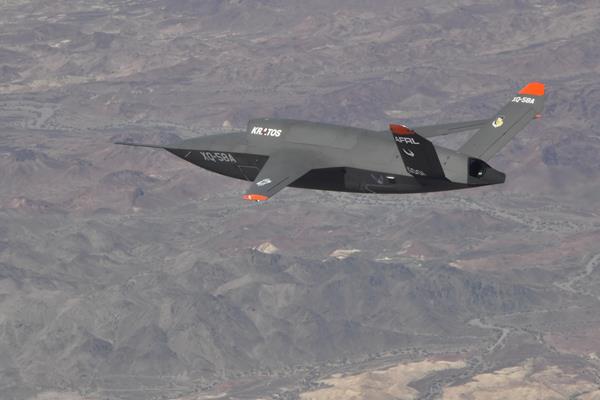Boeing (BA -1.39%), Kratos Defense & Security (KTOS -3.10%), and General Atomics have each won Air Force funding to build an autonomous combat drone. The prototype awards are nice wins for each of the three companies, but they fall short of what investors had hoped would come from the government's "Skyborg" program.
Kratos will receive $37.8 million to build a prototype, while Boeing gets $25.7 million and privately held General Atomics will get $14.3 million. The three companies have five months to build a test drone able to integrate artificial intelligence and autonomous air vehicle technology to operate in dangerous conditions in place of crewed aircraft.
"This award is a major step forward for our game-changing Skyborg capability," Air Force Brig. Gen. Dale White said in a statement announcing the awards. "We will experiment to prove out this technology and to do that we will aggressively test and fly to get this capability into the hands of our warfighters."

Kratos' XQ-58A Valkyrie in flight. Image source: Air Force Photo by 2nd Lt Randolph Abaya, 586 Flight Test Squadron.
To boldly go where no drone has gone before
The Air Force already deploys or is testing several drone programs, from dumb remote-controlled aircraft to next-generation systems that can fly alongside crewed aircraft. The Skyborg program would be a step forward because it is an attempt to create systems able to operate autonomously and to learn from prior missions.
The three winning bidders are expected to deliver drones no later than May 2021, with initial flight testing and experimentation expected to begin in July 2021. The Air Force will equip each of the entrants with an "Autonomous Core System" hardware and software module being developed by Leidos Holdings (LDOS 0.69%) that will be the brains for the drones.
The three finalists were selected from a large pool of interested companies that also included titans Lockheed Martin (LMT 0.40%) and Northrop Grumman (NOC 1.55%), among others.
Kratos in a statement said it would deliver a version of its XQ-58A Valkyrie aircraft, a design the Air Force has already conducted tests on for a separate "loyal wingman" concept. Boeing and General Atomics also have existing platforms that should be easily modified to meet the tight deadline.
All in, the Air Force has a pool of up to $400 million available for eventual orders, with more money expected in future budgets if the program performs to expectations.
Could Skyborg end up vaporware?
The question for investors right now is how eager the Air Force is to spend the money available. Roman Schweizer, defense analyst with Cowen Washington Research Group, found the award "underwhelming given all the hype." That makes him wonder how committed the Air Force is to Skyborg.
"The military can actually move very fast to field a technology when it needs/wants it," Schweizer wrote in a commentary on the announcement. "This doesn't appear to be one of those times."
It is worth asking why that is. It could be nothing to worry about, simply a case of Air Force evaluators having a hard time differentiating between a large field of candidates and wanting more time with the three most promising. But it could also be a question of running out the clock on the program ahead of a new administration and potentially changing priorities.

Boeing's Airpower Teaming System drone. Image source: Boeing.
The risk is most pronounced with Kratos, a small company waging war against deep-pocketed giants like Boeing. Kratos' strength has always been a first-mover advantage. The Valkyrie drone has been on trials with the Air Force for more than a year now and, based on comments from Air Force officials, many had expected an initial production order by now.
Boeing's alternative is barely past the prototype phase. In October, it moved under its own power for the first time, ahead of a planned first flight. Boeing is also developing the plane overseas with the Royal Australian Air Force, and not domestically. But as each day passes, Kratos' first-mover advantage is diminishing. It's no reason to hit the panic button, but something Kratos shareholders should at least keep in mind.
Where to from here?
It's too soon to say if these awards will lead to any big-money contracts. Given the fluid nature of the Air Force's effort, it is even possible a Northrop or Lockheed Martin could work their way back into the mix in the months to come.
What we do know is that concepts like Skyborg are the future of warfare, and defense contractors that are best able to adapt to the changing landscape should be set up well to succeed. The Air Force has articulated a desire to be nimbler in plane contracting in the years to come. Efforts like Skyborg should help determine how Air Force procurement evolves.
If nothing else, the awards provide a fresh validation of Boeing and Kratos technologies and give the companies a seat at the table as the Air Force works through some of these questions and plots its future. No matter what happens with Skyborg, these awards can have long-term significance for the companies involved.





